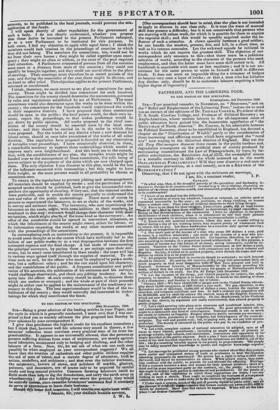TO THE•EDITOR OF THE SPECTATOR. .
• 30th November, 1830. Stn—Being.a. great admirer of the leading articles in your Paper, and the style in which it is generally conducted, I must own that I Was sur- prised to find you so warmly advocate the plan proposed last Sunday in your cOliimns by your correspondent S. • .
I give that gentleman the highest credit for his excellent intentions ; but I. think that, however. well his scheme may sound in theory, a few minutes' reflection. must convince every practical than of Its utter im- practicability. - It appears to me universally allowed, that the persons at present suffering distress_ from. want of employment; are mostly agricul- tural laboniers, eCcuStomed only to hedging and ditching, and' the other labours • of a farm.. -Now Sir,. let me askof what use can, such men possibly be when employed as employed correspondent suggests ? We all know that the erection of: cathedrals and other public ' edifices requires the aid of men of talent; and a- certain degree of eduCation; 'such: as artists, Modellers, and architects t: and that even the inferioe*Orkthen„ the carpenters,. heweis atone, ,and polishers df inarble,..- glaziere, painters' and decoratoes, are of trades only to be acquired br.eatefdr. .study and long manual practice. Common- farming labothers- could do little more than.helo to dig the foundations and carry earth away in wheelbarroiva! After the building rose-abLve the ground, they would he entirely nieletisi,.sinceenenithebrieklayereassistanta.find it `necessary
to serve as apprentices.-to learntheir.husinesse- . . .• . • Shoitld this letter .find insertion-Lwill troUbleyerti*dahiett'sfelk.' I *remain, Sir; your obedient humble servant, I. W. L.
[Our correspondent should bear in mind, that the plaids not Intended to apply to distress in one dual only. It is true the want of manual skill does present a difficulty, but it is not conceivable that persons who are starving will refuse work, for which it is possible for them to acquire the requisite skill ; and this would be speedily acquired under the in- fluence of such a stimulus. A clown speedily becomes a good soldier; he can handle the musket, present, fire, and kill, in a short time, as well as his veteran comrades. Let the awkward squads be initiated in works which do not require the greatest skill. The objection of our correspondent only amounts to this—that there must be a judicious selection of works, according to the character of the persons who need employment, and that the latter must have some skill suited to it. All handicraft is acquirable with more or less readiness ; and it is not un- common for the same person to unite in himself a skill in different kinds. It does not seem an impossible thing for a trimmer of hedges to become very soon a layer of bricks ; or that a man wholas hitherto dug ditches only, should be fit to undertake labours requiringa little higher degree of ingenuity]


























 Previous page
Previous page